Last Updated on February 12, 2023
Let’s go back in time and discover the rich history of the Zulu Kingdom – a fascinating and proud civilization that once ruled over the southern regions of Africa.
From their legendary leader, Shaka Zulu, to their military prowess and unique cultural traditions, the Zulu Kingdom has left a lasting legacy on the continent and the world.
If you’re a lover of African history, join us as we delve into the captivating story of this mighty kingdom and uncover the stories, customs, and traditions that have been passed down for generations.
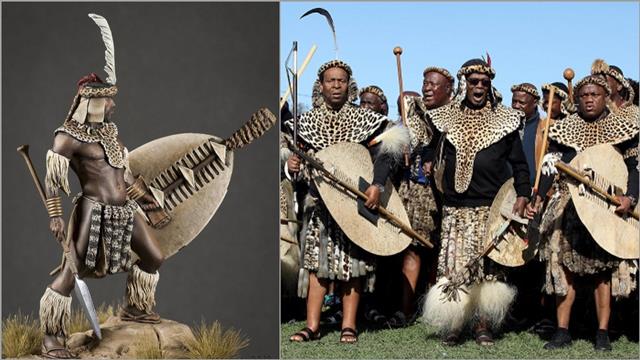
A Background on the Zulu Kingdom
The Zulu Kingdom was a powerful and influential civilization that existed in southern Africa from the late 18th century to the late 19th century. Its origins can be traced back to the early Zulu tribe.
This small group of people lived in the region now known as KwaZulu-Natal in South Africa. Over time, the tribe grew in size and strength, eventually becoming a dominant force in the area.
Under the leadership of Shaka Zulu, the Zulu Kingdom was transformed into a mighty empire that expanded its territory and influence.
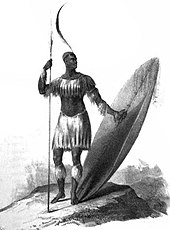
Shaka Zulu was a visionary leader who introduced innovative military tactics and strategies. He made the Zulu army a force to be reckoned with, ruling with an iron fist. He established a strong central government that helped to unify the kingdom and secure its borders.
The Zulu Kingdom was not just a military power. It was also a rich and diverse culture with its own unique customs, traditions, and beliefs.
From intricate dances and traditional attire to fascinating rituals and ceremonies, the Zulu Kingdom was a melting pot of different cultures and practices passed down for generations.
Despite facing numerous challenges and obstacles, including resistance from neighboring tribes and European colonizers, the Zulu Kingdom maintained its independence and cultural heritage for many years.
Today, its legacy continues to live on through the preservation of its rich cultural traditions and the proud traditions of its descendants.
Read: The Impact of European Colonialism on African Societies and Culture
The Rise of the Zulu Kingdom Under Shaka Zulu
The Zulu Kingdom began as a small tribe in southern Africa. But under the leadership of Shaka Zulu, it was transformed into a powerful empire that dominated the region and left a lasting impact on African history.
Shaka Zulu was born in the late 18th century and grew up during a time of great political turbulence in southern Africa. Despite facing numerous challenges and obstacles, he rose to prominence through his military skills and leadership abilities.
He became the leader of the Zulu tribe in 1816 and immediately set about modernizing and transforming the tribe’s military.
One of Shaka Zulu’s most innovative contributions was developing a new fighting style known as the “bull horn formation.”
This formation involved surrounding the enemy on three sides with a fourth side left open for retreat. It was highly effective and allowed the Zulu army to defeat much larger and better-equipped forces.
Shaka Zulu also introduced new weapons and tactics. For example, the short stabbing spear gave the Zulu warriors a significant advantage in battle.
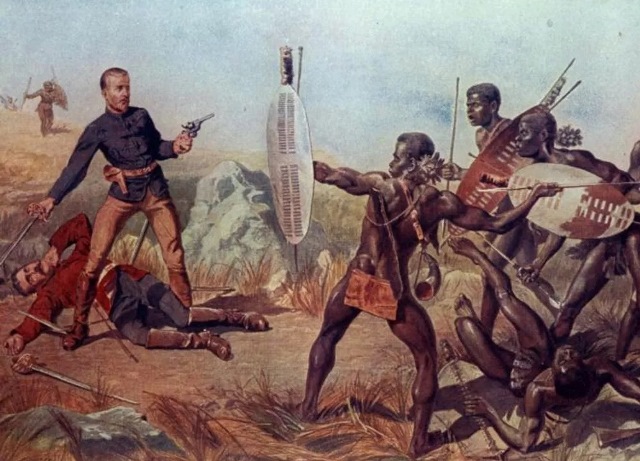
Under Shaka Zulu’s rule, the Zulu Kingdom rapidly expanded its territory and influence. He soaked up neighboring tribes and established a strong central government. The Zulu army was feared and respected by its enemies, and the kingdom became a dominant force in southern Africa.
However, the rise of the Zulu Kingdom was not without its challenges. The kingdom faced resistance from neighboring tribes and European colonizers, who sought to exploit its resources and undermine its power. But despite these obstacles, Shaka Zulu and his successors maintained the kingdom’s independence and strength for many years.
The Cultural Traditions of the Zulu Kingdom
The ancient Zulu Kingdom was known for its diverse cultural traditions and proud heritage. There were unique traditional music and dance, detailed beadwork, and intricate basketry, among others. As such, the kingdom formed an important part of South African history and identity. Even to this day.
Music and dance are two well-known cultural traditions of the Zulu Kingdom. The Zulus are famous for their lively, energetic dances at traditional celebrations and ceremonies. These dances are performed to the beat of drums and the sound of singing, and they often involve complicated footwork, rhythmic movements, and energetic jumps.
Another important cultural tradition of the Zulu Kingdom is its beadwork and basketry. The Zulus are skilled craftsmen and women. They create complex but beautiful beadwork designs that are used to adorn clothing, jewelry, and other items. They also make baskets and other woven goods that are used for practical and decorative purposes.
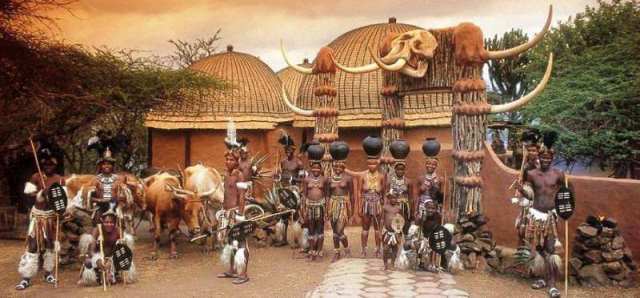
In addition to its traditional music and dance, the Zulu Kingdom was also known for its rich oral tradition. Storytellers, or “izibongo,” were highly respected members of the community and played an essential role in preserving the history and traditions of the kingdom.
They passed down stories, legendaries, and cultural practices from one generation to the next, helping to keep the kingdom’s rich cultural heritage alive.
The Zulu Kingdom was also known for its traditional healing practices. These practices used herbs, roots, and other natural remedies to treat illness and injury.
They were based on the belief that spiritual and physical health were closely interconnected and continue to be an important part of South African culture and identity.
Marriage Practices Among the Zulus
The Zulus practice polygyny. This marriage system allows a man to have multiple wives. They also adhere to the customs of levirate marriage, in which a widow marries her husband’s brother,
Interestingly, the community also practiced and still practices ghost marriage, in which a widow “marries” a deceased relative for her offspring to continue the deceased man’s family line. A basis of early Zulu religious practices was ancestor worship. However, the predominant religion today is Christianity.
Read: The Role of Traditional African Medicine in Modern Healthcare
The British Invasion and the Battle of Isandlwana
The British Invasion and the Battle of Isandlwana were two major events in Zulu history. They also affected South Africa as a whole. The invasion, which took place in the late 19th century, marked the beginning of British colonial rule in the region.
It had a lasting impact on the Zulu people and their culture.
The Battle of Isandlwana, fought during the Anglo-Zulu War of 1879, was one of the conflict’s largest and most significant battles. It also had wide-ranging consequences for both the Zulu Kingdom and the British Empire.
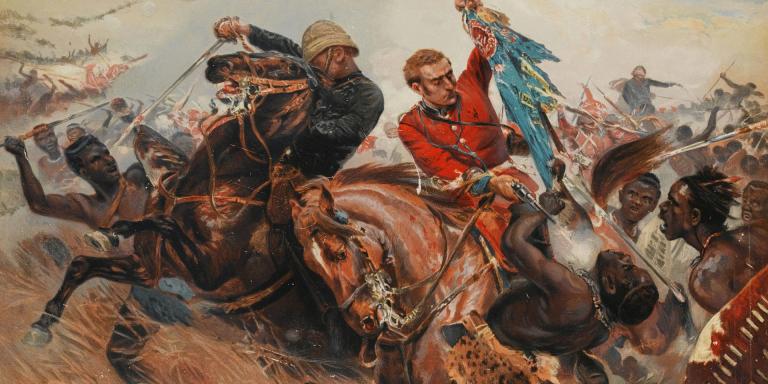
The British, already in control of neighboring territories, saw the Zulu Kingdom as a major obstacle to their expansion. So, they set out to conquer it and bring it under their control.
Read: Boer Wars: South Africa, Conflict, Colonialism, Resistance
Wars and British Control
The Anglo-Zulu War of 1879 resulted from these efforts, as the British declared war on the Zulu Kingdom. They sought to defeat it and bring it under their control. The Battle of Isandlwana fought on January 22nd, 1879, was one of the conflict’s most significant and bloody battles.
This battle took place near Isandlwana Hill in modern-day South Africa. It saw the Zulu army, led by King Cetshwayo, engage the British forces in a fierce battle.
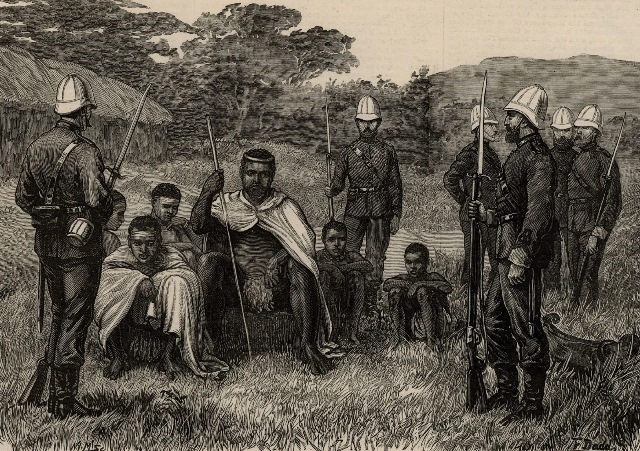
Despite being outnumbered and outgunned, the Zulu army fought bravely and put up a strong resistance against the British forces.
However, the British gained the upper hand and eventually defeated the Zulu army. This resulted in one of the largest and bloodiest defeats in the history of the Zulu Kingdom. The aftermath of the battle was devastating, as thousands of Zulu warriors were killed, and the kingdom was left in disarray.
Ultimately, the Battle of Isandlwana had enormous consequences for both the Zulu Kingdom and the British Empire. The defeat of the Zulu army marked the beginning of the end for the once-great kingdom.
On the other hand, the British were able to conquer and colonize it. As expected, this event ended the Kingdom’s independence and cultural traditions.
Read: The Ethiopian Empire and Its Resistance to Colonialism
The Legacy of the Zulu Kingdom
The Zulu Kingdom was one of the largest and most powerful African states in the nineteenth century. Nearly 150 years after the British defeated it, its legacy is still felt today.
Not only that, the Zulus and their culture also left an indelible imprint on South African history. Today, their influence can still be seen and felt throughout the region.
The Zulu Kingdom has also left a lasting impact on the natural environment of South Africa. During its time, the Kingdom was known for its lush and fertile lands and its impact on the landscape.
It was also known for its rich wildlife. This legacy continues to be felt in the many protected areas and wildlife reserves established in South Africa since its fall.
Finally, the legacy of the Zulu Kingdom is also seen in the many monuments, museums, and historical sites. Some of these have been established in South Africa to commemorate its history and culture.
These sites serve as a testament to the Zulu people’s proud heritage and culture. And they offer visitors a glimpse into the rich history of the Zulu Kingdom and its impact on the world.
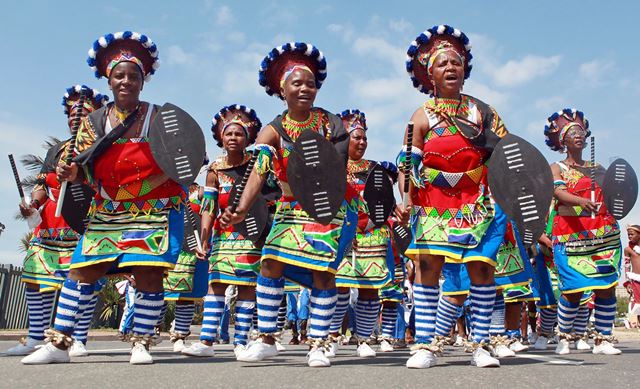
Zulu Kingdom Today
KwaZulu was a South African bantustan intended by the apartheid government as a semi-independent homeland for the Zulus. In 1980, the capital was relocated from Nongoma to Ulundi.
Chief Mangosuthu Buthelezi of the Zulu royal family and leader of the Inkatha Freedom Party (IFP) was the leader until it collapsed in 1994.
Then, the surrounding South African province of Natal was merged with it to form the new province of KwaZulu-Natal. The name kwaZulu translates roughly as Zululand or Place of Zulus.
The area that was once the Zulu Kingdom is now part of South Africa’s KwaZulu-Natal province, one of the country’s nine provinces.
A large portion of the territory comprises wildlife reserves, and tourism is a major source of income – the area is known for its savanna-covered hills. Within the Zululand Rhino Reserve, there is a WWF Black Rhinoceros reintroduction project known as “The Black Rhino Range Expansion Project” (ZRR).
The traditional components of Zulu society are still prevalent among the modern Zulu. Villages in the KwaZulu settlements of Natal are structured around a hierarchy consisting of older men who serve as clan chiefs and the heads of clan sections under the king.
Before you go…
Hey, thank you for reading this blog to the end. I hope it was helpful. Let me tell you a little bit about Nicholas Idoko Technologies. We help businesses and companies build an online presence by developing web, mobile, desktop, and blockchain applications.
We also help aspiring software developers and programmers learn the skills they need to have a successful career. Take your first step to becoming a programming boss by joining our Learn To Code academy today!











